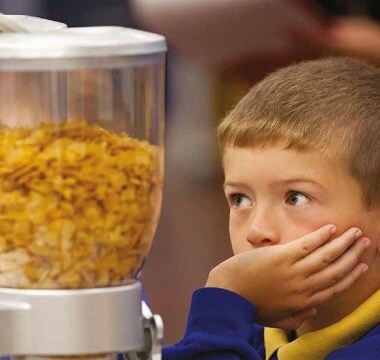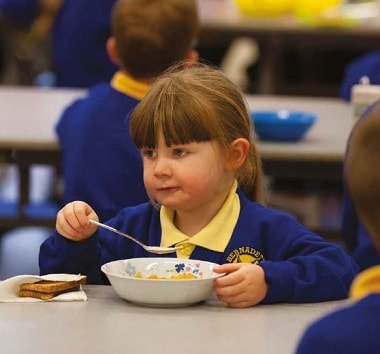Feeding Potential across Europe
Today in Europe, even in countries like Great Britain and Ireland, one in five children go to bed hungry. In others like Germany, Sweden, Denmark, Spain and Italy there are significant numbers of young people who don’t get breakfast at home. That’s why we continue to do our bit to help children have a nutritious breakfast to fuel their days.
According to a study by Kellogg’s Spain, 87% of teachers said ‘Breakfast for Better Days’ helped improve levels of concentration within the classroom. Being hungry can impair concentration, cause behavioural problems and impact learning. That’s why when Kellogg’s first started Breakfast Clubs in Europe 1998 in the UK. It was intended to fill the gap for children who might otherwise not have had anything to eat before school each day.
Two decades after we opened our first breakfast club, our clubs are now part and parcel of school life where children can enjoy breakfast with their teachers and classmates before school.

Kellogg’s in the UK makes donations to around 250 school breakfast clubs each year helping around 15,000 school kids from struggling communities get breakfast every day.
When we asked teachers for their views on the impact of the breakfast clubs on the children’s educational progress, they noted an improvement in performance and class attendance.
In 2016, Kellogg’s UK Breakfast Club Survey showed that 90% of teachers said that Kellogg’s Breakfast Clubs helped improve class attendance and 94% said that the clubs helped improve punctuality.
“Knowing we are feeding them, they are fed and happy,” said one teacher. “They are cranky and upset if they don’t eat. Even if they are late they will still get something.”
Another teacher said the significance of the clubs came down to one simple factor: feeding children who would otherwise not have breakfast available to them.
“[It’s] knowing they are having something to eat they would not have gotten otherwise.” reported the teacher.

One school said: “We get feedback from teachers about children that wouldn’t have been having breakfast before and now they see them as more alert and more responsive in the class. In on time, getting more opportunities for important work in the morning, when everyone is bright and ready. Some children were missing out on this, phonics etc., teachers are happy they are getting more out of school. Concentration is improved, the attitude as well.”
To get an idea of the ethos behind the scheme, we must go back to 1930 when our Kellogg’s founder, W.K. Kellogg, created the W.K.Kellogg Foundation, an organisation that donates grants and breakfasts to charitable organisations around the world. Out of the foundation’s ongoing philanthropic efforts grew the idea for a breakfast club in schools - a fitting endeavour for our foundation whose mission statement is “to help children succeed.”
As one teacher told us, “All the teaching strategies in the world cannot teach a child who is hungry.”
1 Sinead Keenan (2015) One in five Irish children go to school or bed hungry. This has to stop. Available at: The Journal.ie (Accessed: March 26th 2018).
2 Kellogg's (2016) 'Breakfast for Better Days' UK Breakfast Club Survey 2016, United Kingdom: Kellogg’s UK




